Can Social Media and Digital Learning Transform Education Paradigms?
- mzayfert
- Sep 3, 2024
- 2 min read
Can Social Media and Digital Learning Transform Education Paradigms?
By Marilyn Zayfert, August 2024

In the wake of rapid technological advancements and ongoing cultural shifts, the question arises: Can social media and digital learning redefine the future of education?
Back in 2012, I explored this question in depth, inspired by Sir Ken Robinson's compelling critique of traditional educational models. His work remains influential, highlighting the need to modernize education to better align with today's evolving societal needs. Now, as we navigate the post-pandemic landscape, these ideas have gained even more relevance. Can Social Media and Digital Learning Transform Education Paradigms
Sir Ken Robinson, a renowned author and advocate for educational reform, challenged the status quo with his thought-provoking talk, "Changing Paradigms in Education," which gained widespread attention for its insightful critique of conventional schooling. Robinson's emphasis on small, impactful changes resonated deeply, revealing systemic issues within our education system and inspiring many to reconsider how we approach learning. Robinson's ideas echo principles found in progressive educational philosophies like Montessori and Reggio Emilia. The Montessori Method, developed in the 1890s, emphasizes self-directed learning and individual growth, while the Reggio Emilia approach, established after World War II, focuses on experiential learning and student agency. Both models advocate for a more holistic and personalized approach to education.
As we progress into an era marked by technological innovation, the traditional educational model, rooted in the Industrial Revolution, seems increasingly outdated. The rigid, factory-like structures of past schooling systems no longer meet the demands of our rapidly changing world. So, what's the path forward?
Robinson argues that we must adapt our educational frameworks to prepare students for an uncertain future. This involves embracing the rapid pace of change and integrating new communication technologies, such as social media, into the learning process. By leveraging these tools, we can create dynamic and engaging learning environments that foster collaboration, creativity, and critical thinking.
Incorporating digital learning into education can bridge the gap between outdated methods and contemporary needs. Social media platforms and digital tools offer innovative ways to facilitate collaborative learning and encourage diverse forms of expression. As communication modalities evolve, so too must our educational practices.
Raising educational standards to meet the demands of the global economy is crucial. However, defining these standards poses a challenge. Traditional assessments often fail to capture the full spectrum of student potential, leading to a need for more nuanced and flexible evaluation methods.
According to Robinson, transforming education requires a shift in our understanding of human capacity and a departure from outdated classifications of academic and non-academic skills. Emphasizing collaboration and group learning aligns with modern educational needs and fosters personal growth.
By implementing digital learning strategies and embracing new technologies, we can drive significant progress within the education system. Small, targeted changes can lead to meaningful improvements, paving the way for a more effective and inclusive educational paradigm.
Marilyn Zayfert is a digital strategist and marketing expert, dedicated to advancing online and mobile applications. As the founder of illumiNET Creative Media, Marilyn specializes in developing and executing digital marketing strategies. Connect with her on Twitter @mzayfert or visit her website at illuminetmedia.com.










Comments